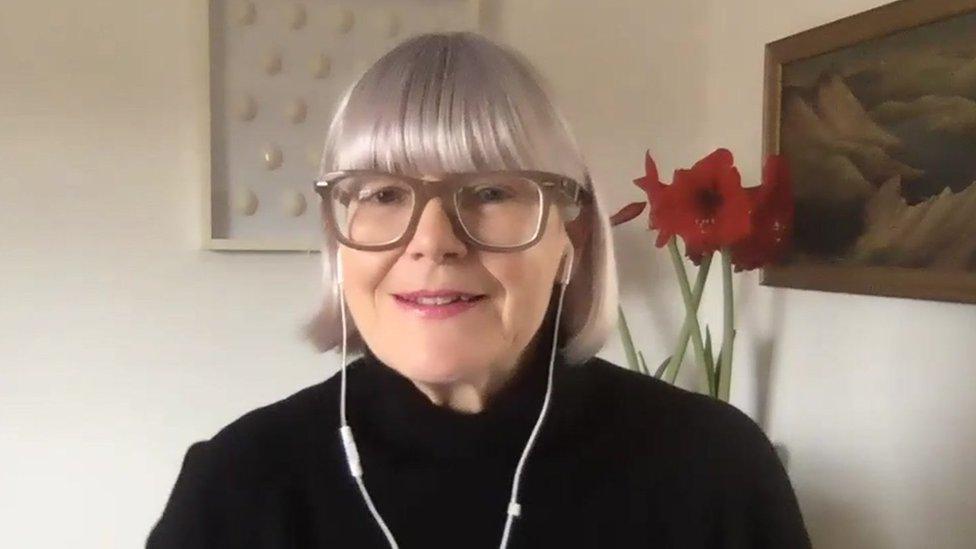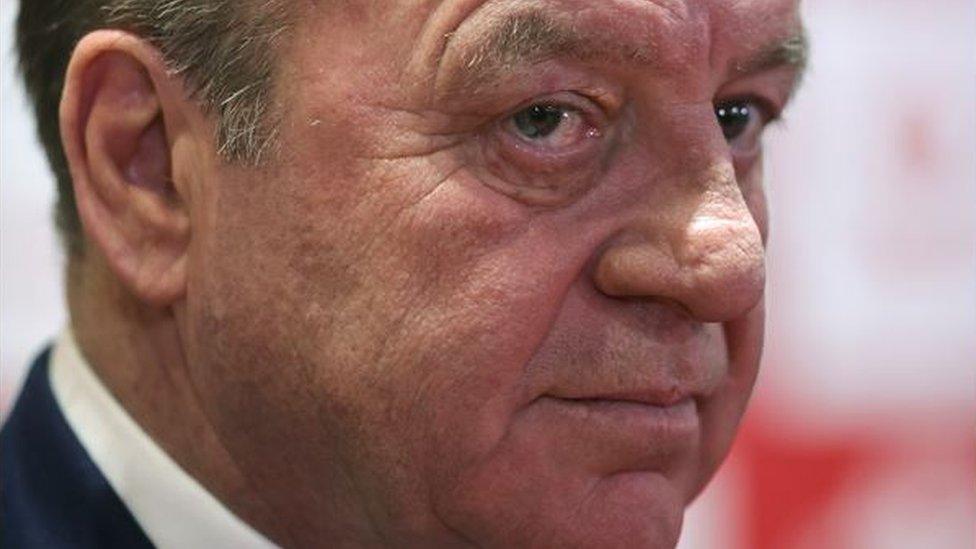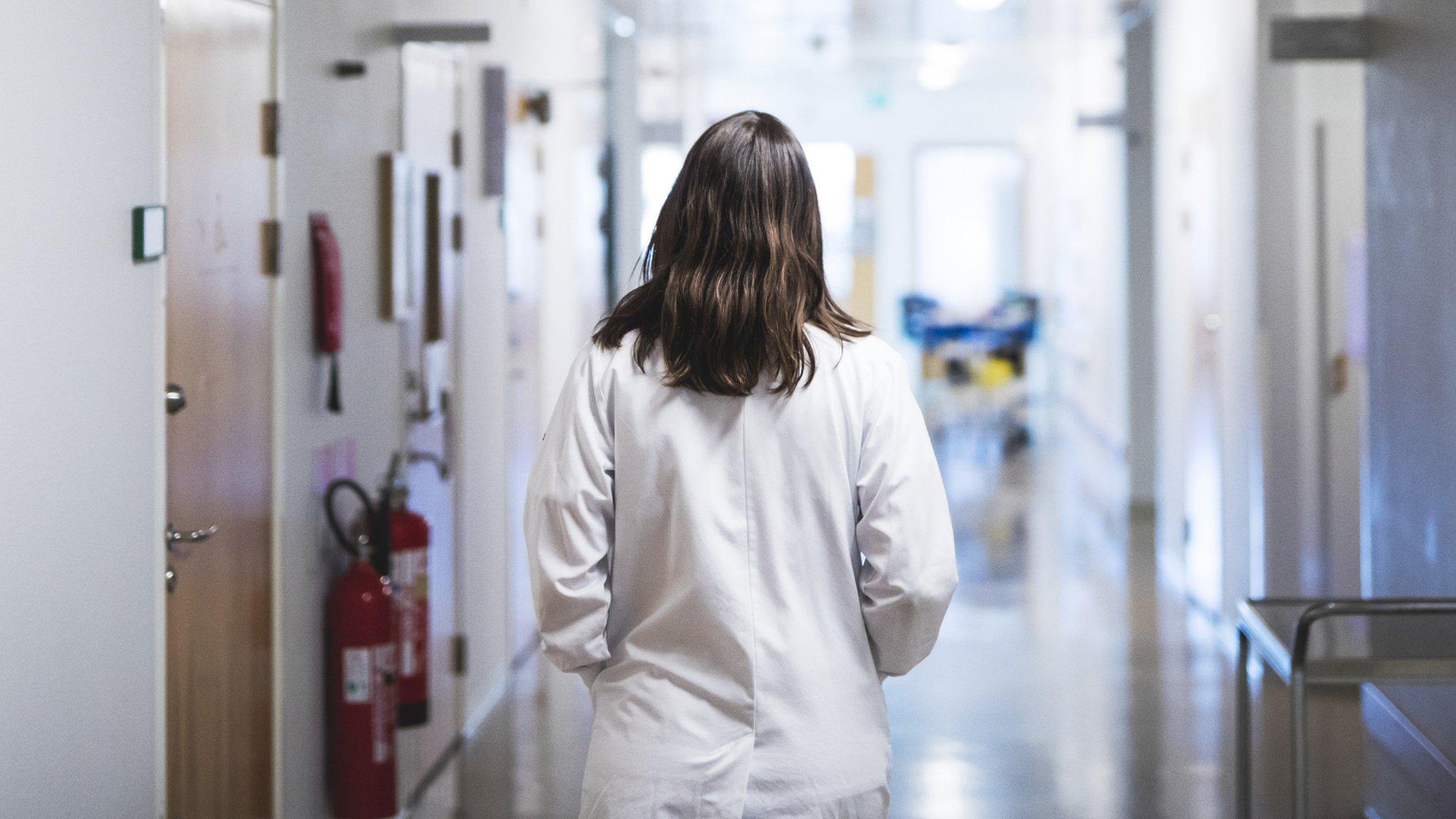Sexual harassment: Women working in NHS 'pressured into sex'
- Published

Many trainees don't report inappropriate behaviour fearing it will affect their careers
Senior doctors say female medics have felt pressured into sexual activity with colleagues.
Four women who head up medical royal colleges in Wales have written an open letter describing misogyny, bullying and sexual harassment in the workplace, external.
They told BBC Wales that female staff had been asked for sex by male colleagues while on shift.
The Welsh government said: "Harassment and sexual violence is abhorrent and has no place in our NHS."
Chairwoman of the Royal College of Psychiatrists in Wales, Dr Maria Atkins, said: "I've heard from multiple women over the years that during night-time shifts, they've been propositioned by male colleagues and felt pressured to engage in sexual acts.
"When they've refused they are penalised.
"It can be very damaging to some less experienced or younger women, because they will be discouraged from engaging with a team, which might have been the speciality of medicine that they wanted to progress their career in."
A major analysis of NHS staff reported female surgeons are being sexually harassed, assaulted and, in some cases, raped by colleagues.

The open letter makes it clear that these issues are not confined to surgery or anaesthetics but are commonplace.
"As a junior doctor or medical student, professionally it's dangerous to raise concerns," said Dr Rowena Christmas, chairwoman of the body representing GPs in Wales.
She said the power imbalance in making complaints about those who can influence your career played a huge part.
"So you don't say anything and then you carry a great burden of guilt, thinking, 'I've let myself down. I've let my colleagues down. I should have done something' and that's hard as well."
She added that the problems were rife when she was at the start of her career but haven't gone away.
"It's very easy as a GP partner of 23 years to stand your ground and not put up with anything. I don't need the reference any more. But you can't say that junior doctors who are afraid to call problems out are lacking resilience."
Following last week's report, a controversial letter was published in The Times from a retired Swansea anaesthetist suggested this behaviour should be tolerated.
That led to Swansea Bay health board issuing a statement on behalf of over 70 current staff strongly rejecting his views.
The open letter is co-signed by:
Dr Olwen Williams - chairwoman, Welsh Academy of Medical Royal Colleges
Dr Hilary Williams - vice-president for Wales, Royal College of Physicians
Dr Rowena Christmas - chairwoman Royal College of GPs Wales
Dr Maria Atkins - chairwoman Royal College of Psychiatrists Wales
It is also supported by a number of senior doctors from groups representing medical professionals.
Dr Hilary Williams said there was widespread sexual innuendo when she was a trainee.
"We didn't have the language to discuss it, and we very much put up and shut up."
But she said conversations with trainees today showed it was happening right across medicine, with examples including male doctors "rating people on their sexual attributes or what they're wearing".
She added that there were also also examples of women "feeling very vulnerable when they're on their own with a senior doctor who makes a much more sexualized comment or something that feels much more threatening".
Their letter highlights the training pattern of rotating through different departments and different health boards can, unintentionally, enable inappropriate behaviour to go unchallenged.
"What has happened time and time again, is the trainee gets removed from that situation to protect them."
Dr Williams said that, as trainees are employed by the educational division of NHS Wales, the mechanisms are not always there to deal with the perpetrator who is employed by a health board.
"It's quite frightening to think that the perpetrators are in some way being protected by current systems - not necessarily deliberately," she added.
Dr Christmas said she remembered being bullied by one senior colleague, but decided to put up with it as she only had eight weeks left before she was moved elsewhere.
"If I'm putting up with it for another eight weeks, the next person coming along behind me is also having to deal with it."
The signatories have supported the call for urgent measures to improve investigations into sexual misconduct in healthcare, including the reporting process.

Dr Olwen Williams has also signed the open letter
The letter stated: "Trainees and newly qualified consultant colleagues tell us that the reporting systems are weak… the risk of career damage is too great for many to want to speak out."
The letter also highlights the poor behaviour of some women, who have themselves been bullied: "Cruelty leads to cruelty... toxic cultures breed toxic behaviour."
The Welsh government added: "We wholeheartedly agree all acts of misogyny and misconduct should be called out and addressed.
"We encourage the NHS to support criminal proceedings against anyone who assaults staff.
"This week we published the Speaking up Safely Framework for NHS Wales, which will strengthen procedures and provide assurances that concerns will be taken seriously, heard fairly and people will not experience personal repercussions."
Related topics
- Published25 January 2023

- Published5 September 2021
